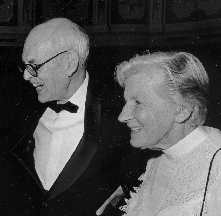 |
|
MATHEMATICS
AND SOCIETY
The Nathan and Beatrice Keyfitz Lectures in Mathematics and
the Social Sciences
March 14, 2011 -- 6:00 p.m.
GEORGE LAKOFF
Linguistics Dept., University of California Berkeley
Location: Health Sciences Building,
155 College Street (map)
|
|

|
The Cognitive and Neural Basis of Mathematics
Mathematics is a human creation. A few extremely simple
mathematical ideas are there in infants. The rest has been
created by human mathematicians, using basic (and largely
unconscious) cognitive mechanisms discovered in the cognitive
and brain sciences, such as frames, conceptual metaphors,
image-schemas, and neural bindings. The idea of infinite things
(infinite numbers, points at infinity, infinite sets, infinite
decimals, etc.) arises from a single conceptual metaphor used
in many branches of mathematics. Concepts like imaginary numbers,
logarithms, trigonometric functions, etc. also arise via frames,
metaphorical concepts, and neural bindings. Mathematical ideas
are like other ideas, but there is a set of constraints that
make them mathematical ideas and not just ideas.
This understanding of mathematics is scientific in nature,
coming from the brain and cognitive sciences. It utterly undermines
the romantic idea that mathematics is just out there in the
world, or in some Platonic universe. It also undermines the
usual accounts of the “foundations of mathematics”
— Platonism, formalism, intuitionism, and logicism. All
of these conflicting “foundations” are also remarkable
inventions of human mathematicians with human brains.
The implications for the teaching of mathematics at all levels
are revolutionary. From this perspective, mathematics becomes
understandable to ordinary human beings.
|
George P. Lakoff is an American cognitive linguist and professor
of linguistics at the University of California, Berkeley,
where he has taught since 1972. Although some of his research
involves questions traditionally pursued by linguists, such
as the conditions under which a certain linguistic construction
is grammatically viable, he is most famous for his ideas about
the centrality of metaphor to human thinking, political behavior
and society.
Professor Lakoff is particularly famous for his concept of
the "embodied mind", which he has written about
in relation to mathematics. In recent years he has applied
his work to the realm of politics, exploring this in his books.
|
Audio and Slides of the talk will be available on line after March
14
The Keyfitz Lectures are meant to be of interest to the university
community as well as to individuals involved in public administration,
economics, health policy, social and political science. The purpose
of the series is both to inform the public of some of the ways quantitative
methods are being used to design solutions to societal problems,
and to encourage dialogue between mathematical and social scientists.
All lectures are open to the public and everyone is welcome.
Back to top
|
 |


